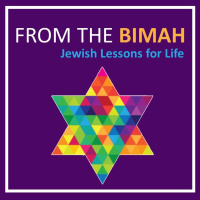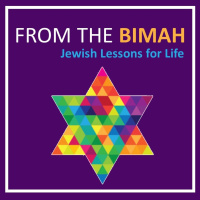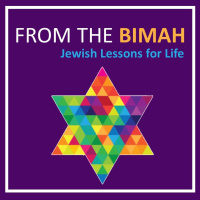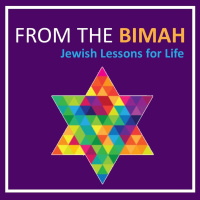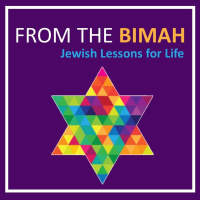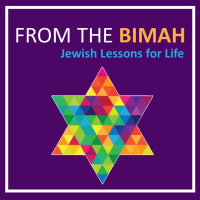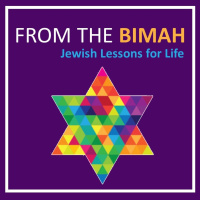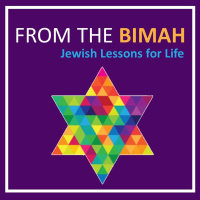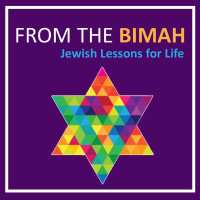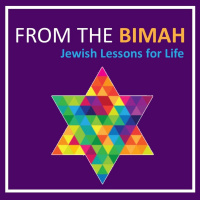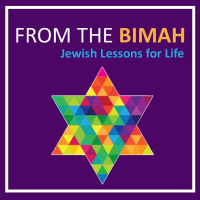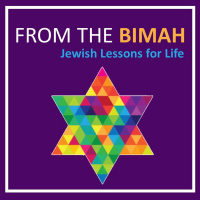Synopsis
Bringing weekly Jewish insights into your life. Join Rabbi Wes Gardenswartz, Rabbi Michelle Robinson and Rav-Hazzan Aliza Berger of Temple Emanuel in Newton, MA as they share modern ancient wisdom.
Episodes
-
Talmud Class: Do the Two Psalms We Say Every Morning and Every Evening (Psalms 121 and 130) Help?
28/10/2023 Duration: 46minElie Wiesel talked about madness descending on Europe in the 1930s. Cultured, urbane, sophisticated Germans who loved opera and philosophy, and who were nice to their dogs and cats, warmed to the Nazis. A similar madness is descending on American college campuses and universities today. It is madness because throngs of students feel that Israel is an apartheid regime; that it is morally always in the wrong; that Hamas was justified in doing what it did; and therefore, these undergrads and graduate students will criticize Israel only and will not criticize Hamas at all. J.J. Kimche, a graduate student in Jewish history at Harvard, recently published a piece in the Wall Street Journal entitled “Harvard Shrugs at Jew-Hatred.” This is his concluding paragraph: As a grandson of an Auschwitz survivor and a student of German-Jewish history, I was always incredulous that highly cultured Germans, the people of Goethe and Beethoven, could have displayed sympathy and even enthusiasm for the Nazi slaughter of the Jews.
-
Shabbat Sermon: The Paradox of Forever Love with Rabbi Wes Gardenswartz
23/10/2023 Duration: 23minI would like to start with something lovely, the most beautiful words in the world: I love you forever. Think of the people and places that have inspired these magical words. I have a question. How long is forever? How long do we get to keep who and what we love forever? This past Monday, our beloved friend and teacher in Jerusalem, Micah Goodman, was speaking to 100 Conservative Rabbis about what is going on in Israel, and he said something about forever love that is so quintessentially Micah. I had never heard it before. But once he said it, it was obviously true. Micah observed that there is a paradox about what we love forever. Namely, if we assume that what we love forever, we will have forever, then we will not have it forever; we are at serious risk of losing it. But if we worry that what we love forever we may lose, it may not last forever, and if we work hard on preserving it, there is a higher chance that we can hold onto it. If we assume it
-
Talmud Class: What Does the Coda to the Noah Story Say About Noah, About Israel and About Us?
21/10/2023 Duration: 52minThe weekly Torah portion always speaks to our world, but never more so than now. The word hamas is in the third verse of the portion. The presence of hamas spells the ruination, death, destruction of the entire world. "The earth became corrupt before God; the earth was filled with lawlessness (hamas)." Genesis 6:11 In his JPS Commentary on Genesis, Nahum Sarna observes “hamas here refers predominantly to the arrogant disregard for the sanctity and inviolability of human life.” A violent society will meet a violent end. The world filled with hamas must come to an end. Innocent people will die. That is our portion. Tragically, that is our world. The story is well known, but it is the less well-known coda to the story that also speaks so loudly to our times. Noah and his family survived. They were alive and well. Plus, God promised repeatedly that God would never again destroy the world. The first never again is spoken by God. You might think that Noah was in for better days. The flood is beh
-
Shabbat Sermon: Our Golda Moment with Rabbi Wes Gardenswartz
14/10/2023 Duration: 16minHow many of you have seen the play or the movie Golda’s Balcony? If you have, you know about that powerful moment, early in her career for Israel, she is Golda Meyerson at the time, it is January, 1948, it is three years after the Shoah, it is five months before Israel’s independence would be declared and the war for independence would start, and Golda is with American Jews, at the General Assembly of Jewish Federations, held in Chicago on January 21. Her mission was to inspire American Jews to support the incipient Jewish state and the Jewish army in the war for its very existence. She was supposed to raise $25 million. She ended up raising $50 million. Make no mistake. This is our Golda moment. Golda’s secret sauce contained three ingredients. They apply to us with equal force. First, American Jews in 1948 learned of horrors and atrocities, murder and death, that befell innocent Jews of Europe. Slaughter. It made American Jews angry, sick to their stomach, nauseous, worried, grief-stricken, and de
-
Talmud Class: Israel at War and the Challenge of Hate
14/10/2023 Duration: 50minAt the rally for Israel on Monday at the Boston Commons, there were two clarifying moments. When Senator Markey called for de-escalation, he was loudly and roundly booed. When Congressman Auchincloss observed that Israel did not ask America to de-escalate on 9/12, he was loudly and roundly cheered. What is that about? Last Shabbat was the worst day for the Jewish people since the Holocaust. This week is the worst week for the Jewish people since the Holocaust. The prayer we say about Nazis on Yom HaShoah applies with equal force to Hamas. It is as if it were written for Hamas. The obscene and ongoing barbarism, savagery, cruelty, inhumanity of Hamas raises a question: what do we do with the hatred that can take root in our own soul as a result of Hamas’s evil? Consider the Haftarah for Shabbat Zachor, wherein God commands genocide: Thus said the Lord of Hosts: I am exacting the penalty for what Amalek did to Israel, for the assault he made upon them on the road, on their wa
-
Talmud Class: Does the Last Chapter of the Torah Provide Us a Guide for How to Live and Die?
07/10/2023 Duration: 42minThe last chapter of any book is critical to understanding the meaning of the book. The last chapter of the Torah, Deuteronomy 34, which we encounter this weekend on Simchat Torah, is in several ways a surprising last chapter, given the book as a whole. The Torah is supposed to be about life. Choose life. But Deuteronomy 34 is about death. Why end with death when the book is supposed to be about life? Why does Moses have to die on the wrong side of the River Jordan? Why does God command Moses to climb to the top of Mount Nebo to see the river he can never cross and the land he can never enter? How is this fair and just? We only read this sad chapter--Moses’s death on the wrong side of the River Jordan, his life work unfulfilled--on Simchat Torah, which celebrates the joy of Torah. How does Moses’s death fit with the larger agenda of the joy of Torah? What do we learn about how to die, and more importantly how to live, from the last chapter of the Torah?
-
Sukkot Day 2 Sermon: We're Keeping the Etrog Tree with Rav Hazzan Aliza Berger
01/10/2023 Duration: 08minOctober 1, 2023
-
Sukkot Day 1 Sermon: Would You Rather Be a Supreme Court Justice or a RICO Defendant? Choosing Ice Cream vs. Choosing Life with Rabbi Wes Gardenswartz
30/09/2023 Duration: 18minI have two classmates from the Harvard Law School class of 1986 who are extraordinarily famous. World famous, but for different reasons. One of them, Elana Kagan, is a Justice on the United States Supreme Court. She just made news recently because she has argued that the nine justices of the Supreme Court should be held accountable for their ethical practices, and that power without accountability is not a healthy combination in a democracy. The other of them, Kenneth Chesebro, made news recently for being indicted as one of the 19 defendants in the Georgia RICO case for allegedly attempting to overturn the 2020 election. Mr. Chesebro is presumed innocent. The prosecution must prove its case beyond a reasonable doubt. But if convicted, he faces jail time. I have been thinking so much recently about their different trajectories: Supreme Court Justice. RICO defendant. And I have been wondering how did their paths diverge so dramatically?
-
Talmud Class: "I Don't Do Pessimism" Our Posture? Should it Be?
30/09/2023 Duration: 55minIn his final podcast of 'For Heaven’s Sake' for the year 5783, entitled “Farewell 5783,” Donniel Hartman said something that really stuck with me. He said: “I don’t do pessimism.” Despite all the drama and tension in Israel, the many articles and voices talking about how the country is deeply divided, how this is the greatest domestic crisis in Israel’s 75 years, a cold civil war, Donniel does not do pessimism. He goes to demonstrations every week; learns; teaches; advocates; gives public speeches; does podcasts. But he will not surrender to pessimism. Donniel here channels the spirit of the late Shimon Peres who famously observed: “Optimists and pessimists die the exact same death, but they live very different lives!” Do Jewish texts have a position about pessimism? Are there circumstances when pessimism is not only okay, but even called for? On the one hand, there is no shortage of texts in the Donniel/Shimon Peres tradition of eschewing pessimism. Hagar crying at the well when she and Ish
-
Yom Kippur Sermon: Next, Next! Now, Now! with Rabbi Wes Gardenswartz
24/09/2023 Duration: 18minA writer named Robert Hubbell is not Jewish. He and his wife are both observant Catholics. But earlier this year he wrote an essay entitled “My Kippah” about the fact that one of his most cherished possessions is a kippah. He did not know any Jews growing up. One of the first Jewish people he ever got to know was a law school classmate, a woman who became a fast platonic friend and study partner. After they graduated from law school, their friendship continued, and Robert Hubbell and his wife were invited by this friend to join what she called their synagogue havurah, a group of friends that met regularly for conversation, learning and friendship. This observant Catholic couple finds themselves going to Shabbat dinners, Passover seders, Neila services at the Temple and the break-fast after Yom Kippur was over. At all these moments, Robert Hubbell would borrow a kippah and return it when the event was over. When his friend had her first son, Robert Hubbell and his wife attended the brit milah. Before th
-
Yom Kippur Sermon: When the Dragons are Not Small with Rabbi Michelle Robinson
23/09/2023 Duration: 17minSeptember 25, 2023
-
Shabbat Sermon: Distance Travelled with Rabbi Wes Gardenswartz
23/09/2023 Duration: 13minEvery August there is a show called Hard Knocks about the training camp of an NFL football team. This year the show focused on the New York Jets because of their new quarterback Aaron Rodgers. If you are not a football fan, Aaron Rodgers was a legendary quarterback of the Green Bay Packers where he won both a Super Bowl and the Most Valuable Player of the league four times—two times in the last three years. Rodgers was thought to be the missing piece that would help the New York Jets compete for a Super Bowl this year. The Jets had a lot of stars on their team, but they were missing a great quarterback. Aaron Rodgers was that great quarterback, their missing piece. His presence created tremendous excitement and expectations. Hard Knocks devoted five full episodes to the building, mounting, surging, soaring excitement that the Jets, so mediocre for so long, were now about to have their moment. I watched all five episodes. I did it for our congregation since I was searching for High
-
Talmud Class: Is the Peretz Story an Adequate Response to the Pain in Our World?
23/09/2023 Duration: 31minFor our Talmud class this week, we read the classic short story If Not Higher, written by the Yiddish writer I.L. Peretz (1852-1915). Dr. Stephen Greenblatt, a proud alum of the Temple Emanuel Hebrew School, and a University Professor at Harvard, where he is the world’s preeminent Shakespeare scholar, teaches us If Not Higher before Neilah on Monday night. As you read this story, consider these questions: What is the theory of goodness, decency, menschlikeit that the rabbi in the story embodies? Do you consider the rabbi’s posture an adequate response to the pain in our world? When we read Unetaneh Tokef this year, there is so much pain: who by fire (Maui), who by water (Libya), who an untimely end (the victims of Russia’s evil war against Ukraine). The list goes on. If that is our world, and it is, sadly, does Peretz offer us a response that is commensurate to the problem? What is the role of ritual, halakhah, Jewish law, in the rabbi’s life, and how does it relate to how he acts? What is the relatio
-
Rosh Hashanah Day 2 Sermon: What’s Your Cathedral? with Rabbi Wes Gardenswartz
17/09/2023 Duration: 20minThere is an old joke about a mother who wakes up her son and says: Honey, you have to get up. It’s time to go to shul. The son resists. I don’t want to go to shul. I want to sleep. Honey, you have to go to shul. I don’t want to go to shul. I want to sleep. You can’t sleep. You have to go to shul. Give me one good reason. Give you one good reason? What about: you’re the rabbi! What do we do about the things we don’t want to do? It’s easy to respond to the things we want to do. Want to go to the Taylor Swift concert? Yes. Want to go watch the Patriots, Red Sox, Celtics or Bruins? Yes. Want to go away to the Berkshires or Cape or Martha’s Vineyard with your loved ones? Yes. But what about the stuff we don’t want to do? Two things are both true, and they cut in opposite directions. One, people like doing what they want to do when they want to do it, not what they feel they have to do. Like the rabbi in the joke who does not want to have to go to shul, we resist wha
-
Rosh Hashanah Day 1 Sermon: When I Was Younger with Rabbi Michelle Robinson
16/09/2023 Duration: 18minSeptember 16, 2023 Rosh Hashanah Day 1
-
Rosh Hashanah Day 1 Sermon: Unstuck with Rabbi Wes Gardenswartz
16/09/2023 Duration: 16minOn March 18, 1980, a young historian named Marty Sherwin, then age 43, signed a contract with Knopf publishing to write a biography of J. Robert Oppenheimer, the so-called father of the atomic bomb. When Marty Sherwin signed the deal, both he and the publishing house expected that it would be a five-year project. He was to get paid $70,000, $35,000 up front, and the remainder five years later when the book was to have been completed. But, famously, five years later, he had not completed the book. In fact, five years later, he had not even started writing it. Marty Sherwin was a meticulous researcher, and he found himself in a rabbit hole. He would spend twenty years doing research on Oppenheimer. His research came to 50,000 pages of original sources, including 8,000 pages of FBI records. There were more than 100 records of interviews. So for twenty years, Marty Sherwin accumulated box after box of material. Boxes in his attic. Boxes in his basement. Boxes in his of
-
Shabbat Sermon: The Lottery Ticket That Wins Every Time with Rabbi Wes Gardenswartz
09/09/2023 Duration: 15minThe story is told of a man named Harry whose business had fallen on hard times. He goes to shul and prays: God, I don’t often ask you for things, but my business is failing, and I need a miracle now. Please help me win the lottery. The lottery happens, and he doesn’t win. He is feeling the financial squeeze. If he doesn’t get help soon, he might lose his house. So off he goes to shul and prays: God, my business is going belly up, I don’t want to lose my house. Please help me win the lottery. The next week, the lottery happens again, and he doesn’t win. Off he goes to shul a third time and prays: God, my business has failed, it looks like we’re not going to keep our house, my health is deteriorating, my marriage is on the rocks. Please help me win the lottery. To his utter amazement, something happens right then and there that had never ever happened to Harry before: God answered back. From the heavens God thundered: Harry, I would like to help you win the lottery, I really would, but first you ha
-
Talmud Class: What, If Anything, Do We Have to Believe to be a Good Jew?
09/09/2023 Duration: 45min“In this house we believe that…” American lawn signs confidently proclaim that the members of this house all believe the same things: and the sign then lists the tenets that the members of the home all believe. These lawn signs cover a wide gamut of political convictions. All of which made me wonder: what, if anything, do we have to believe to be considered a good Jew? This is particularly vexing because we famously disagree, two Jews, three opinions. And what happens if we don’t believe, or want to believe but can’t believe, or if we are offended at the notion that we are supposed/required/expected/commanded to believe? What if we believe that belief should be organic, intuitive, freely chosen? As the holidays approach, we usually think it is our deeds we need to work on. Do we also need to work on our beliefs, or not? Another way to put it: It is said that Judaism is a religion of deed, not creed. Is this true? Watch as we share the texts and learning of Donniel Hartman’s lecture from the Shalom
-
Shabbat Sermon: Quit Sooner with Rav Hazzan Aliza Berger
02/09/2023 Duration: 13minRecently I’ve become obsessed with the reality show Alone. The premise is that 10 survivalists are dropped in the wilds of Alaska or Patagonia or Mongolia with only the clothes on their back, 10 tools, and camera gear to document their experiences. It’s wild to watch. They build primitive shelters and hunt with bows and arrows. There is a lot of ingenuity, but there is also a lot of suffering. A lot of shivering through cold nights, a lot of hunger, a lot of loneliness. And what’s so interesting for me is that every season, there is this refrain that you hear from the contestants. They’ll say, “I’m miserable. I’m lonely; I’m hungry; I’m tired; I’m cold. I wish I could just go home and eat good food in a warm room with my family. But I’m not a quitter. I’m not going to quit.” How do we understand this ethos? I am miserable. I am cold and tired and hungry. What I am doing is actively making me unhappy. And yet, because I committed to this thing, because I said I would, because our culture frowns up
-
Shabbat Sermon: Hitting the Ever-Moving Target of Jewish Education with Rabbi Ravid Tilles
26/08/2023 Duration: 22minIt seems the goal-post of how we reach and teach the next generation is always moving. As parents, grandparents, educators, and a community who cares, how do we get it right? How can we move the next generation toward an indelible connection to Judaism now and for generations to come? Rabbi Ravid Tilles has been the Director of Jewish Life and Learning at Schechter Boston since 2017. Schechter Boston is a Jewish Day School in Newton for students from 15 months to 8th grade. He and his family are also members of the Temple Emanuel community. Before moving to Newton, Rabbi Tilles was the Associate Rabbi at the Merrick Jewish Centre in Merrick, Long Island and has served multiple communities in various educational/pastoral capacities. He received ordination from the Jewish Theological Seminary in 2013 where he also earned a masters degree and certificate in Pastoral Care.

